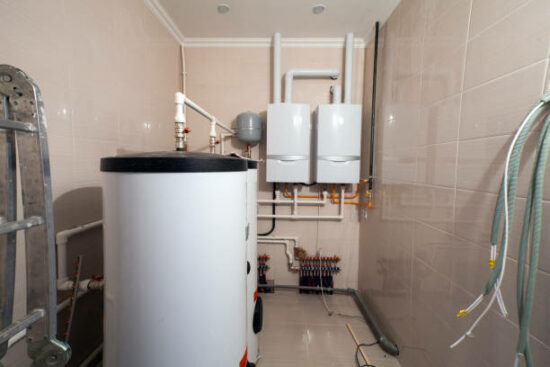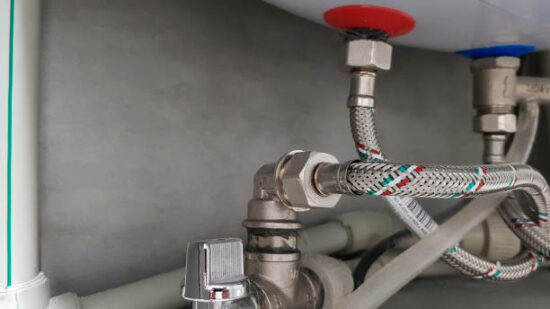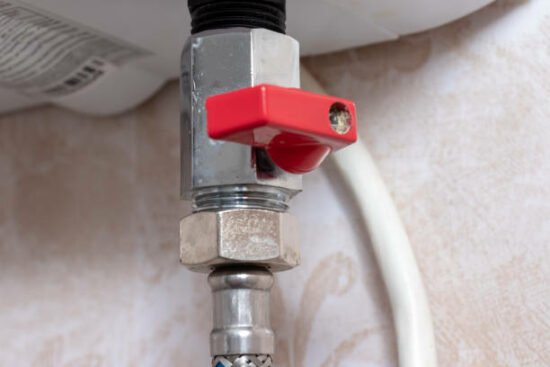Are you wondering how long a new hot water tank will heat up? If you’ve recently purchased a new hot water tank, you may wonder how soon after installation you can enjoy hot showers.
Table Of Contents
−- Types of Water Heaters
- Installation Considerations
- Cost of Installing a New Water Heater
- Maintenance Tips to Extend Lifespan
- Factors Affecting Hot Water Tank Heating Time
- How to Maximize Hot Water Tank Efficiency
- How to Troubleshoot Hot Water Tank Issues
- Safely Disposing of an Old Hot Water Tank
- Best Practices for Setting the Temperature of Hot Water Tank
- Final Thoughts
In this blog post, we’ll cover the factors that affect the length of time it takes for your new hot water tank to heat up and provide some helpful tips on speeding up the process.

Types of Water Heaters
It’s important to know what type of water heater you have before determining how long it will take to heat up. Generally, electric storage tank water heaters can take 60-80 minutes to heat up, while propane storage tank water heaters can take 30-40 minutes.
On the other hand, propane tankless water heaters are the fastest, heating up almost instantly. A gas tank water heater will take roughly 40 minutes to warm up new inbound water for the first time. Electric conventional water heaters take around 30 to 40 minutes to heat up.
However, gas water heaters are the quickest, taking only 30 to 40 minutes to heat water once it enters the tank. It’s important to note that electric water heaters can take anywhere from 45 minutes to 1 hour and 20 minutes to heat their tanks fully.
Installation Considerations

Several factors can affect the time it takes for the tank to heat up when installing a new hot water tank. It is important to ensure that your hot water tank is properly sized for your home, as an undersized or oversized tank may take longer to heat up.
Also, proper installation of the tank is necessary to help ensure the best performance. Installing the tank in an area with good ventilation and away from direct sunlight or other heat sources will help reduce the time it takes for the tank to heat up.
Cost of Installing a New Water Heater
The cost of installing a new water heater can vary greatly depending on the type of water heater you select, the size of the tank, and the complexity of the installation. Electric water heaters are generally cheaper than gas heaters, as gas tanks require additional parts for installation.
The tank’s size and the installation’s complexity can affect the cost. It is important to research the different types of water heaters and get professional help properly sizing and installing the water heater for the best performance.
Maintenance Tips to Extend Lifespan
Maintaining your hot water tank is important for ensuring its longevity and maximizing efficiency. Regularly flushing out your tank can help prevent scale and sediment buildup, which can reduce the efficiency of your tank and cause it to take longer to heat the water.
Checking the pressure relief valves and temperature and pressure valves can help prevent any difficult issues from developing. Inspecting for leaks and rusting can also help you catch any problems before they become bigger.
Finally, changing the anode rod every few years can help slow down corrosion, which can extend the life of your tank. Following these maintenance tips will not only help you extend the lifespan of your hot water tank but can also help you get the most out of it and ensure it runs safely and efficiently.
Factors Affecting Hot Water Tank Heating Time
When it comes to the time a hot water tank takes to heat up, there are several factors to consider. The type of water heater, the size of the tank, the temperature setting, the incoming water temperature, and the amount of water being heated are all important considerations.
Electric storage tank water heaters typically take the longest to heat up, ranging from 60-80 minutes. On the other hand, propane storage tank water heaters and propane tankless water heaters heat up much more quickly in just 30-40 minutes.
Gas tank water heaters also require less time to warm up, at around 40 minutes. Electric conventional water heaters take the longest to heat up, ranging from 30 minutes to 1 hour and 20 minutes.
To maximize the efficiency of your hot water tank and reduce the time it takes to heat up, there are several things you can do. Make sure the tank is properly sized for your home and that it is installed correctly.
Proper maintenance can also help extend the lifespan of your hot water tank and keep it running efficiently. Be sure to check the temperature setting regularly and adjust it as necessary. You should also take steps to minimize the water being heated at once, such as by taking shorter showers. Finally, if you have an old hot water tank, safely dispose of it.
How to Maximize Hot Water Tank Efficiency
Awareness of the type of water heater you have, the size of its tank, and the power of its heating element are key to maximizing the efficiency of your hot water tank.
An electric water heater will require more power to heat a given volume than a gas heater. As such, ensuring that you have an appropriately sized electric heater with a powerful enough heating element to quickly and efficiently heat your hot water is important.
If your hot water tank is not professionally installed, it is important to ensure that it is properly insulated to prevent heat loss. Regular maintenance, such as flushing the tank and checking the heating elements, can also help to maximize the efficiency of your hot water tank.

How to Troubleshoot Hot Water Tank Issues
If your hot water tank isn’t heating up as it should, there are a few things you can do to troubleshoot the issue. First, check to make sure power is being supplied to the unit. If it is, then look for any visible signs of damage. Ensure that the thermostat is set correctly and that no blockages prevent the water from circulating through the tank.
You may need to call a professional to inspect the unit if everything looks okay. You should also check the manufacturer’s website for troubleshooting steps specific to your model. In some cases, adjusting the tank’s temperature or making other minor adjustments can resolve the issue. It may be time to replace the hot water tank if all else fails.
Safely Disposing of an Old Hot Water Tank
Once you decide to replace your old hot water tank with a new one, it’s important to dispose of the old tank safely and responsibly. Improper disposal of an old hot water tank can be hazardous and lead to environmental damage. Contact a professional disposal service or your local municipality for advice to ensure that your old hot water tank is disposed of properly.
Before disposal, it’s important to ensure that any remaining water or gas is completely drained from the tank. If you are uncertain how to do this, contact a licensed plumber or professional. Once the tank is completely emptied, it can be transported to a licensed recycling center or scrapyard for proper disposal.
When disposing of an old hot water tank, it’s critical to follow the appropriate safety protocols to protect yourself and those around you. Ensure the tank is properly sealed and that any exposed pipes or fittings are properly capped and disconnected. Additionally, it’s important to note that some tanks may contain asbestos, so take the necessary precautions to protect yourself and others if this is the case.
Following these steps can help ensure that your old hot water tank is disposed of safely and efficiently.
Best Practices for Setting the Temperature of Hot Water Tank
Setting the temperature of your hot water tank is an important part of getting the most out of your appliance. While it may be tempting to set it to the highest temperature possible, this is not advisable. Too high a temperature can cause the tank to overheat, leading to a dangerous situation.
It can also damage the tank or other components of your plumbing system. The best practice is to set the temperature to the manufacturer’s recommended setting, usually between 120 and 140 degrees Fahrenheit. Doing so will ensure you get the most out of your hot water tank while avoiding dangerous overheating.
It is also important to note that if you have children or older adults in your home, you may want to set the temperature to a lower setting for safety reasons. This will ensure that no one gets scalded by hot water. Additionally, you should regularly check your hot water tank to ensure that it is functioning properly and that the temperature is set correctly.
Final Thoughts
Congrats! You have now learned how long a new hot water tank takes to heat and some tips and tricks to maximize efficiency, extend its lifespan, and troubleshoot any issues. Knowing these things can help you make the most out of your hot water tank, saving you time and money in the long run.
It is important to remember that the size, type, and installation location of your hot water tank will affect the time it takes to heat you and its efficiency. Consult a qualified technician when installing your new hot water tank, as proper installation is key for optimal performance.
Follow best practices for setting the temperature and safely disposing of an old tank. With these tips and tricks, you can be sure your hot water tank will be up and running in no time!

Jay
Jay is a health and wellness enthusiast with expertise in water quality and nutrition. As a knowledgeable advocate for holistic well-being, Jay successfully manages Type 2 Diabetes through informed lifestyle choices. Committed to sharing reliable and authoritative insights, Jay combines firsthand experience with a passion for enhancing health."
